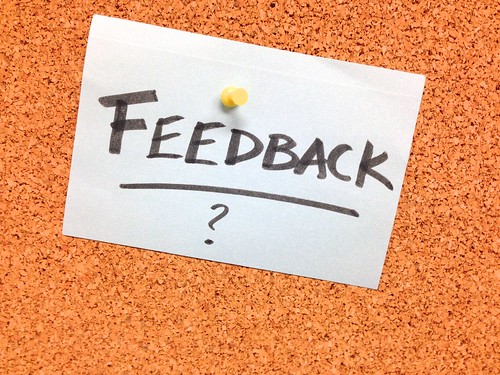Feedback really is a gift. But feedback can also be hard, both to give and to get. I moved into a leadership role a little over a year ago, and got my first hard-hitting feedback at the end of 2016.
The fall was a stressful time for our entire team. We were launching something completely new with fewer people than we needed and inherently inflexible deadlines. I was pulled in multiple directions as I tried to build what our team would do more broadly, champion this one huge project, and do a fair bit of individual-contributor work that really did have to be done by me in the circumstances. Everyone else was faced with wearing too many hats, too. We managed to maintain a very high quality through the fall but we were all worried about what was looming in the new year.
Late fall, my lead initiated a feedback process for me that included everyone on our team and a bunch of folks that worked with us. I also did a self evaluation. It's a standardized process used with all folks in leadership roles. I got a report back with a summary of scores on the various questions and the written responses, but of course none of the names to go with them.
When I first got the report, my heart just sank. How poorly I had calibrated my self-evaluation is what struck me first - most scores given to me seemed really low. Then I started to read the written stuff and my heart sank even lower.
Nothing written was mean, and in fact, none of it was unfair. It took a day or two of reflection, but the feedback was absolutely right.
I wonder if there are known stages of absorbing feedback, like the stages of grieving. At first I felt shock, then I felt a little upset, and then I felt horrible about how I had made the team's lives harder in some ways. It was difficult to realize how much less self-aware I was in some areas than I imagined.
After reading the report I had a session with one of our internal coaches. I definitely cried a little in that session. We worked through the feedback, me talking through what likely caused it and how I missed realizing what I was doing. It was extremely valuable and I highly recommend doing something similar if you can.
The coach gave me some suggestions for how to address the feedback with my team. At our next standup I brought it up using her advice and cried a little again. The team was so wonderful. It became really clear that the feedback came from a place of us all caring about each other very much. It was a difficult but very important experience.
I was able to put some of the plan for addressing the feedback into action before leaving to have a baby a couple of months later. My biggest takeaway, besides the specifics of the feedback, is that I need to give and ask for feedback more often. It's not always easy, and it might make you cry a little, but it is so so worth it.


Oh, there's definitely tricks...paper reviews can often be brutal, and unlike team feedback many of the reviewers don't care that much for phrasing things constructively (as they don't really need to work with you the next week).
ReplyDeleteBest approach is to expect the worst, read it quickly (skim even), then let it be for a couple of days. That way the stages of shock / anger can subside, and you can start digging through the feedback for useful tidbits.
I'd say a much bigger problem with team feedback is the potential for lack of it (because colleagues don't want to complain or whatever). Having good constructive feedback to work with (even if it's harsh) is infinitely better!
You are so right! I actually seem to have mastered the art of receiving feedback for rejected papers. The same approach definitely should apply to team feedback. But either way, thoughtful, constructive feedback is so helpful even if the end result is negative.
ReplyDelete